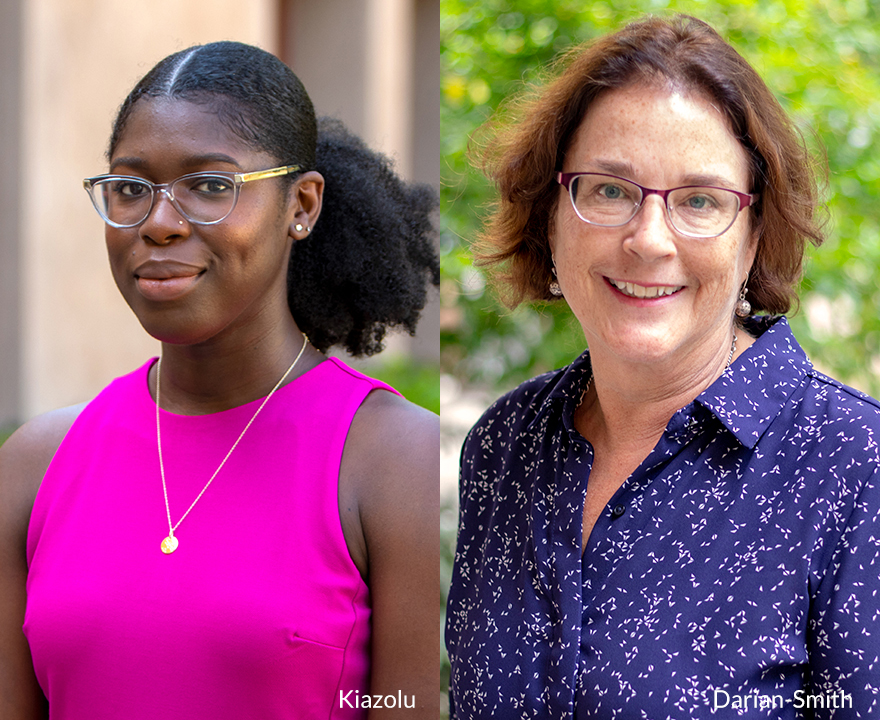Black History Month

Black History Month
- February 12, 2024
- UCI global and international studies professors Yatta Kiazolu and Eve Darian-Smith offer perspective
-----
In honor of Black History Month, UCI social scientists Yatta Kiazolu and Eve Darian-Smith offer their perspective on the field of global studies and its relevance for understanding Black history as an interconnected global phenomenon, unfolding over time in local places among racialized peoples across the United States and elsewhere.
Yatta Kiazolu, Assistant Professor, Global and International Studies, UCI
“When I consider the relevance of Global Studies for our understanding of Black History, I reflect on my undergraduate exposure to Africana studies, which equipped me with language for a perspective that I once took for granted: the study of Black life is deeply intertwined with the broader African world. Black scholars, in the case of the United States, confronted racist narratives of Black people’s history or relegate it to insignificance. Instead, they advanced scholarship that linked Black Americans to the rich and protracted history of the African continent and its place in world history. This includes the work of historian Carter G. Woodson, founder of Negro History Week (now known as Black History Month). Most significantly, these scholars, and the many that followed in their footsteps, illuminated the global dynamics responsible for the exploitation, displacement, and subjugation of Black peoples and their homelands. They highlighted the brutality of Europe’s transatlantic slave trade, western colonialism and imperialism, and later, the emergence of global capitalism as forces that shaped the trajectory of Black peoples worldwide.1
Today, proponents of these oppressive systems seek to undermine fields of knowledge within the humanistic social sciences and humanities that challenge hierarchical, exclusionary, dominant narratives. These narratives maintain the status quo, perpetuating structures of marginalization which increasingly isolates and renders more of our communities closer to death.
Nevertheless, then and now, Black folks have resisted this confinement. As a scholar specializing in Black (women’s) internationalism, I am interested in the ways Black communities forge connections across borders and barriers toward “universal emancipation.” 2 Historical examples abound, from slave uprisings in the U.S. inspired by the Haitian Revolution, Black radicals under violent repression from the U.S. government who looked to communist China for reprieve, civil rights activists demanding the inclusion of anti-colonial language in the United Nations charter, Black activists support for African liberation to lift the status of Black people globally, among countless others. In our contemporary moment, these connections manifest in various forms, such as the solidarity expressed by over 6,000 Black artists, activists, scholars, students with Palestinians under siege. Similarly, prison abolitionists drawing attention to the shared carceral logic underlying mass incarceration and the burgeoning industry of migrant detention and deportation.
From this perspective, Global Studies emerges as a crucial lens through which to explore Black history. Its interdisciplinary approach to examine global linkages enables us to challenge existing paradigms and envision alternative solutions to our shared social, economic, and political problems. By embracing the ethos of “thinking globally, acting locally,” we take seriously Black history month’s original call to disrupt oppressive norms and collectively forge a just world.”
Eve Darian-Smith, Professor and Department Chair, Global and International Studies; Affiliated Faculty Member, Anthropology, Law, Criminology, Law and Society, UCI
“Professor Yatta Kiazolu came to the Department of Global and International Studies in fall 2022 and we could not be more thrilled! She joins a number of faculty in the department who focus on Black critical scholarship, bringing to conversations her broad research interests in U.S. and African American history, women and gender studies, and contemporary African diaspora studies. Significantly, Professor Kiazolu bridges the humanities and social sciences which is a signature feature of the department’s transdisciplinary research agenda. Trained in history, she has also held a UC President’s Postdoctoral Fellow in Ethnic Studies at UC San Diego. She is deeply engaged with humanistic understandings of the solidarities among Black women’s organizations in the U.S. from the 1950s through the 1970s, underscoring intertwined and relational histories of shared political thought and activism. Notably, she has also testified before U.S. Congress as an advocate for programs including Deferred Enforced Departure and DACA.
As it is appropriately said, African American history is American history. But it is also a complex, rich deep global history refracted through local and national contexts, interweaving diverse cultures, worldviews, oppressions, emotions, ethics, inspirations and dreams over centuries to emerge in the current moment of explicit global interconnection. Professor Kiazolu is helping us all better understand and appreciate these complex historical processes and pursue dreams of more inclusive global futures.”
---
1 See Robin D. G. Kelley, “‘But a Local Phase of a World Problem’: Black History’s Global Vision, 1883-1950,” The Journal of American History 86, no. 3 (1999): 1045–77. https://doi.org/10.2307/2568605.
2 Michael O. West, William G. Martin, & Fanon Che Wilkins, From Toussaint to Tupac: The Black International since the Age of Revolution (Chapel Hill: University of North Carolina Press, 2009) 1.
---
UCI School of Social Sciences perspective pieces offer faculty an opportunity to share their expertise and opinions. Read more at https://www.socsci.uci.edu/newsevents/news/index.php.
-----
Would you like to get more involved with the social sciences? Email us at communications@socsci.uci.edu to connect.
Share on:
Related News Items
- Careet RightTen of the best higher education books of 2025
- Careet RightUCI Experts On: Higher education and academic freedom
- Careet RightPolicing Higher Education: The Antidemocratic Attack on Scholars and Why It Matters
- Careet RightFighting Florida's floods and California's wildfires from the classroom | Column
- Careet RightDarian-Smith named J. Ann Tickner Award recipient by the International Studies Association


